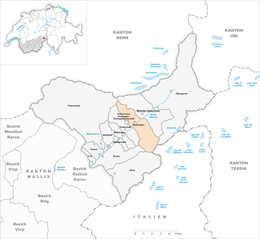Reckingen-Gluringen
| Reckingen-Gluringen | ||
|---|---|---|
| Former municipality of Switzerland | ||
 |
||
|
||
| Coordinates: 46°28′N 8°14′E / 46.467°N 8.233°ECoordinates: 46°28′N 8°14′E / 46.467°N 8.233°E | ||
| Country | Switzerland | |
| Canton | Valais | |
| District | Goms | |
| Government | ||
| • Mayor | Norbert Carlen | |
| Area | ||
| • Total | 41.2 km2 (15.9 sq mi) | |
| Elevation | 1,316 m (4,318 ft) | |
| Population (December 2002) | ||
| • Total | 550 | |
| • Density | 13/km2 (35/sq mi) | |
| Postal code | 3998 | |
| SFOS number | 6075 | |
| Surrounded by | Binn, Ernen, Fieschertal, Formazza (IT-VB), Grafschaft, Münster-Geschinen, Ulrichen | |
| Website |
www SFSO statistics |
|
Reckingen-Gluringen is a former municipality in the district of Goms in the canton of Valais in Switzerland. It was formed in 2004 from the union of the villages and municipalities of Reckingen and Gluringen. On 1 January 2017 the former municipalities of Reckingen-Gluringen, Blitzingen, Grafschaft, Münster-Geschinen and Niederwald merged into the new municipality of Goms.
Reckingen is first mentioned in 1225 as Requinguen. Gluringen is first mentioned in 1203 as Gluringen.
Reckingen-Gluringen has an area, as of 2011[update], of 41.3 square kilometers (15.9 sq mi). Of this area, 27.6% is used for agricultural purposes, while 19.4% is forested. Of the rest of the land, 1.2% is settled (buildings or roads) and 51.8% is unproductive land.
Reckingen lies on both sides of the Rhone river. It consists of three loosely interconnected settlements. Gluringen is on the north flank of the Rhone valley.
Reckingen-Gluringen has a population (as of December 2015[update]) of 436. As of 2008[update], 6.9% of the population are resident foreign nationals. Over the last 10 years (1999–2009 ) the population has changed at a rate of -13.9%. It has changed at a rate of -7.4% due to migration and at a rate of -3.3% due to births and deaths.
As of 2008[update], the gender distribution of the population was 50.1% male and 49.9% female. The population was made up of 228 Swiss men (46.4% of the population) and 18 (3.7%) non-Swiss men. There were 230 Swiss women (46.8%) and 15 (3.1%) non-Swiss women.
...
Wikipedia




